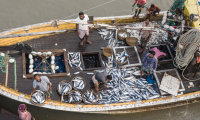The Danish Institute for Human Rights to convene expert meeting on human rights and fisheries

To address the complex interplay between human rights and the fisheries and aquaculture sectors, an international expert meeting is set to convene in Copenhagen on 2-3 November. Hosted by the Danish Institute for Human Rights, the meeting aims to explore the multifaceted challenges and opportunities that arise at this critical intersection.
Fisheries and aquaculture are more than just industries; they are the backbone of livelihoods for nearly 600 million people worldwide, with 492 million relying on small-scale fisheries operations. However, these sectors are fraught with environmental and human rights issues.
Environmental damage and declining fish stocks is having negative implications on the human rights of fishing-dependent communities, calling attention to the interdependence of a safe, clean, healthy, and sustainable environment and the communities’ enjoyment of human rights. At the same time, human rights abuses like forced labour and child labour are widespread in the fishing industry, and the most marginalised fishing-dependent communities bear the brunt of these challenges.
Therefore, effective integration of human rights and human rights methodologies within fisheries governance is important, as it can protect the human dignity of the most marginalised communities while respecting planetary boundaries in the use of available resources.
The marginalised communities at the forefront
Marginalised communities’ rights, insights and traditional knowledge are often overlooked or outright dismissed in international, regional and national legal frameworks. The expert meeting seeks to bring these voices to the forefront. A diverse group of stakeholders, ranging from international agencies to UN human rights mechanisms and representatives from fishing-dependent communities, will assemble to discuss these pressing issues.
Since 2018, the Danish Institute for Human Rights has been actively working with partners to integrate human rights into the fisheries and aquaculture sectors. The project, "Sustainable Oceans - pursuing a human rights-based approach to fisheries and aquaculture" seeks to document and address human rights implications of the sectors, and promote a human-rights based approach to sustainable development.
Read more about the project and find additional resources on
The goal is to foster a dialogue that leads to actionable solutions. By sharing knowledge and experiences, the aim is to outline practical steps for safeguarding human rights in the fishing and aquaculture sectors, all while promoting environmental sustainability.
As a next step, an outcome paper will summarise the discussions and offer a framework for future initiatives. This document will focus on new developments, innovative approaches, and best practices, aiming to provide actionable insights for all stakeholders involved.
